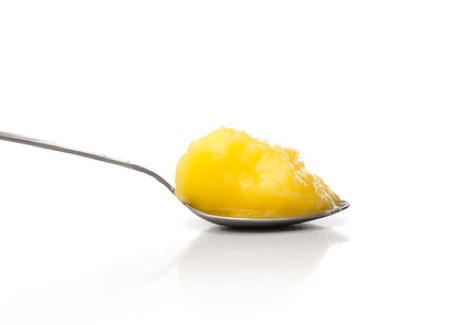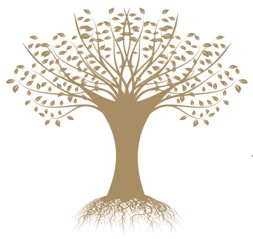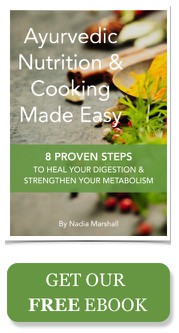By Nadia Marshall
"If the gastric fire is kindled by fuel in the form of ghee, then it cannot be suppressed, even by food that is too heavy" Charaka
What is Ghee?
Ghee is also known as clarified butter. To make ghee, you boil butter very slowly over a super low heat. All of the milk solids and buttermilk separate from the butter oil through this process and are then strained out so all that remains is the butter oil. A nice way to think about it is... ghee is the most subtle essence of grass! Cows eat the grass, digest it and process it into milk and cream... cream is then churned to be turned into butter and buttermilk... then the butter is slowly cooked to be transformed into ghee!
What are its qualities?
From an Ayurvedic perspective, ghee has the following qualities...
Rasa: Sweet
Virya: Cooling
Vipaka: Sweet
Qualities: Light, Subtle
Prapav: Kindles Agni
Actions on the doshas: Tridoshic - balances Vata, Pitta & Kapha (in moderation)
Action on the mind: Sattvic
Ghee's predominant taste is sweet. It has a cooling effect on the body and its post-digestive taste on the body is sweet. It also has a very special effect on the body - the capacity to specifically kindle Agni or increase the digestive fire.
What are its medicinal qualities?
Ghee is held in very high esteem in Ayurveda. Ayurveda teaches that it not only increases our capacity to digest food but also our capacity to absorb and assimilate it. It increases the quality of Sattva (peace/contentment) in the mind and also directly nourishes Ojas (our immune system) as well as Prana (our lifeforce) and all of our Dhatus (tissues). It increases intelligence, refines the intellect and improves the memory. It also lubricates the organs and connective tissues, making the body more flexible. Ghee increases the strength, luster and beauty of the body, slows the aging process and improves our longevity! It is also an excellent wound healer so is helpful with both internal wounds (such as ulcers) and external wounds (especially rashes and burns). It improves the quality of the skin and can even be used as a moisturiser! Ghee has long been used in Ayurveda as a vehicle for administering medicines due to is subtle nature and ability to penetrate the deeper tissues of the body.
The Western viewpoint.
Although ghee is predominantly saturated fat (65%), it has actually been shown to reduce LDL cholesterol. It has the perfect ratio of omega-3:omega-6 oils, and it is a very, very stable oil with a smoke point of 252 degrees celcius - this means, unlike butter and many other oils, you can heat it to high temperatures without it burning or being broken down to form free radicals. And... its short-chain fatty acids are easily metabolised by the body.
Using ghee in your cooking will also decrease the glycemic index of anything you're making (GI = the rate at which blood sugar from carbs are released into your blood stream). The lower the GI, the slower the release (which is what we're after). The primary driver of glycemic index is actually fat content. The more fat, the slower the sugars (‘carbohydrates’) are digested, and the lower the glycemic index. So ghee is good!
Because it is a saturated fat, popular Western nutritionism would advise against its consumption. However, popular nutritionism is not necessarily based on scientific evidence but rather on a complex interplay of politics, history and marketing. In this case, the idea of saturated fat not being good for us was popularized in the 1950s by the 'Lipid Hypothesis'. This hypothesis has now been shown to be false - there are no conclusive scientific links between eating saturated fat and increased cholesterol, increased heart disease or weight gain. Transfats are the problem, not saturated fats. To learn more about this, read my ‘A New View of Cholesterol’ article.
How do you eat it?
In Ayurveda, you can eat a little ghee with almost every meal. You can cook your porridge with it, your curries, your kicharees, your veggies... everything. At home, we use it nearly all the time. The only time we don't is when we're cooking Italian, Middle Eastern or an Asian dish that calls for the taste of another oil...
Why do I love it?
I am an absolute ghee monster. I have a tablespoon or two for breaky, lunch and dinner. With a Vata-Pitta constitution prone to excess heat, dryness and also variable Agni, ghee is my perfect medicine. In many ways it has changed my life. I used to suffer from a morbid fear of fat. I'd avoid eating the stuff at all costs.... When I did eat it, it was unfortunately the type of fat that was really bad for you - synthetic transfats. As a result, I was dry, astringent and hot-headed! I had it all wrong! Through my study and experience of Ayurveda, I've discovered that eating good quality fat in the form of home-made ghee actually helps me maintain my energy levels, maintain my ideal weight and makes my complexion shine from the inside, out. But more importantly (much more importantly) ghee actually improves my digestion and makes me feel incredibly nourished, grounded, nurtured and content! It has brought sweetness and unctuousness into my life, making me more peaceful, a little softer, warmer and kind...
Should anyone avoid eating ghee?
If you have a purely Kapha constitution, a strong Kapha imbalance, have a lot of ama in your system, a liver disorder of some kind or you suffer from very high cholesterol, it would be a good idea to visit an Ayurvedic Practitioner before eating huge quanities of ghee.... but small amounts should be okay.
More reading...
Use of Ghee in Ayurvedic medicine
Ghee and lipid levels research
Fat and glycemic index article
Tell me about your experience with ghee... and why you love it! xx
Love
Nadia



